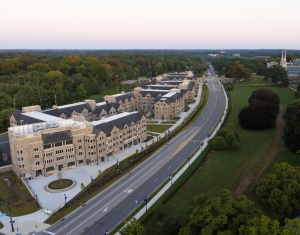Villanova University’s Newest Living and Learning Community, The Commons, Certified LEED Silver

VILLANOVA, Pa. — Villanova University’s newest living-learning community, The Commons, has received Leadership in Energy and Environmental Design (LEED) Silver certification by the US Green Building Council. The most widely used green building rating system in the world, LEED is a recognized symbol of sustainability achievement. The certification highlights projects that create healthy, highly efficient and cost-saving green buildings. Dedicated in August 2019, The Commons is the eighth Villanova LEED certified building.
Highlights from the University’s Silver certification include:
- 43 percent potable water reduction
- Expect to see a 17 percent cost savings from energy usage
- 100 percent of the electricity needed to operate The Commons is powered by renewable energy
- 87 percent of waste from the site was diverted from a landfill either through recycling or reuse
The Commons boasts several additional sustainable benefits in its design. On the outside, all light fixtures are dark sky compliant, reducing light pollution. Two cisterns located underground collect stormwater from the roofs, filter the water and re-use it as makeup water to the high efficiency cooling systems for the buildings. Three bioswales along Lancaster Avenue, designed as walls with seating, remove debris and pollution from surface water runoff. In all, it is estimated that 400,000 gallons of water can be saved each year with this sustainable infrastructure. These areas are also used as stormwater test sites, allowing College of Engineering faculty and students to further their cutting-edge research in the areas of stormwater management and green infrastructure. Inside the buildings are energy-efficient and motion sensor light fixtures and low-flow plumbing fixtures to help reduce energy costs.
The Commons consist of six apartment-style residence halls which house 1,135 students, allowing Villanova to now offer housing to 85 percent of its students. Part of a $225 million transformation of the institution’s former surface parking lots along Lancaster Avenue/Route 30, construction for the project began in November 2015 and was completed in June 2019. The Commons also include the University’s first restaurant, The Refectory, as well as a grab-and-go coffee shop and café two fitness centers equipped with weights, cardiovascular training equipment and aerobics class space for spin classes, etc.; IT TechZone space for students to connect, collaborate and innovate; six community rooms; a smart-locker mailroom; and outdoor courtyards for students to meet and study.
Villanova continues to be recognized as one of the nation’s greenest colleges, having received national recognition for its commitment to sustainability by a number of organizations including the Association for the Advancement of Sustainability in Higher Education (AASHE). Villanova recycles and composts 27 percent of its waste, sending all of its trash to Covanta, an energy-from-waste facility that burns the trash for electricity. The University has installed over 80 hydration stations on campus to make it more convenient to fill up reusable water bottles. The initiative has already saved the equivalent of more than 3.4 million water bottles. Villanova also incorporates its commitment to the environment into its community service initiatives. To learn more about Villanova’s commitment to environmental sustainability, click here.
About Villanova University: Since 1842, Villanova University’s Augustinian Catholic intellectual tradition has been the cornerstone of an academic community in which students learn to think critically, act compassionately and succeed while serving others. There are more than 10,000 undergraduate, graduate and law students in the University's six colleges—the College of Liberal Arts and Sciences, the Villanova School of Business, the College of Engineering, the M. Louise Fitzpatrick College of Nursing, the College of Professional Studies and the Villanova University Charles Widger School of Law. Ranked among the nation’s top universities, Villanova supports its students’ intellectual growth and prepares them to become ethical leaders who create positive change everywhere life takes them. For more, visit www.villanova.edu.
